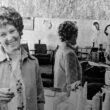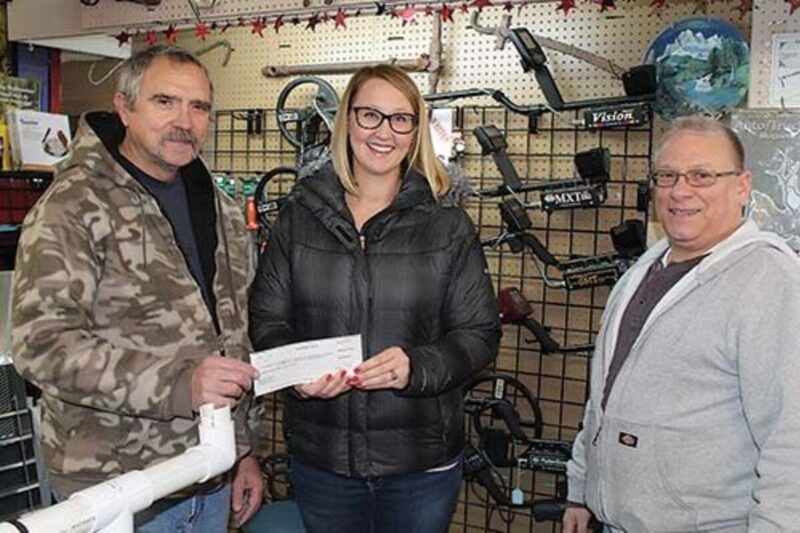Now in its sixth year, the Kids Food Pak program is serving about 70 Sweet Home students each week.
The East Linn Treasure Seekers recently presented a check for $1,500 to help cover the costs of providing food for the weekend to children who might otherwise go hungry during weekends.
Last year, the program served some 200 children each week. The number of children served is tied to donations.
“We wait (to add a backpack) until we have enough money to support a pack for the whole year,” said Nancy Jennings, who founded the program in Sweet Home.
Dave and Nancy Jennings started the program after hearing about it on the television show “The Biggest Loser,” Nancy Jennings said. They went online and found out more. They started out filling two backpacks per week. Others began filling backpacks, and the program was providing six packs per week.
Within a month, the program had 50 people willing to sponsor a backpack, Jennings said.
Right now, “we actually could do almost a hundred,” Jennings said. Most go to elementary students. Sweet Home High School is sending one.
Volunteers send out the backpacks filled with food on Thursdays to students in need, who are identified by school counselors. They have enough food for two breakfasts, two lunches and two dinners. Children return the empty backpacks on Mondays when they return to school and can get breakfast and lunch there.
“It’s huge for them,” Jennings said. “They really don’t know what they’re going to do from Thursday to Monday.”
“It’s a great program,” said Junior High Counselor Shelly Roe, who oversees the distribution of 16 packs per week, down from 20 per week last year. The Sweet Home Education Association, the teachers’ union, donated $1,000 to the program this year. “That’s one of those programs we really want to see continue.”
The reasons they need the food are varied, said Andee McCubbins, who got involved the first year by delivering to Foster School and this year started helping manage the program.
Their families may have no money for food, McCubbins said.
Food stamps have been cut, Jennings said, making it harder for families to provide food. Also, many grandparents are raising children, and they have limited incomes.
“Some of them are living without electricity,” Jennings said. “Some are without water. Some of them are in cars.”
Some are homeless, Jennings said. “I don’t think people realize. Once you start hearing about this stuff, you start recognizing it.”
Often the students who need the backpacks are those who have problems with absenteeism, Roe said. She’ll sometimes have to send packs home with other students. One student stays busy with co-curricular activities, so she drops that pack off at the student’s home.
The students are selected based on need, Roe said. She may hear from one student about other students who are struggling, or a parent may tell her about having a hard time making ends meet.
“A few kids, it’s based on sixth-grade lists,” Roe said.
Sometimes the students say the don’t really need or want it, she said. She estimates that the Junior High has about 25 students who need the program.
McCubbins said the stark reality is eye-opening. Focus is often on starving children in other countries, but “right here at home, we have children starving that can’t make it. You can see the students that don’t have much.”
Some parents are very neglectful, Jennings said, but “we’re not trying to hold the parents accountable.”
Whatever the reason, the Food Pak program is just there to feed children, Jennings said.
“A sixth-grade boy, one of the counselors called him into the office and said, do you want one of these,” McCubbins said. “He started bawling.”
That’s something unusual at that age, and it shows how great the need can be, she said.
“It gives them some self-worth, that people care and there’s hope,” Jennings said.
It makes a difference, McCubbins and Jennings said. They both had parents who grew up in tough situations.
They remembered every kindness, McCubbins said.
Anything was appreciated, whether it was new sock or food, Jennings said.
“We’re not going to change the world by giving backpacks, but if we can make life pleasant for the little ones, why not,” Jennings said.
The program has about 20 faithful volunteers, who fill the packs at the HOPE Center, Jennings said. “Without volunteers, the community support, none of this would happen.”
Donors give money through their churches or directly to those involved in the program. Donations are handled by Community Chapel and are tax-deductible.
Jennings noted that 100 percent of money donated to the program reaches the children.
It costs about $40 per month per pack, Jennings said. Monthly, the program is spending about $2,800.
Volunteers do not add backpacks until money is available for the entire year, Jennings said.
Fair Share Gleaners donates bread to the program, and the Pepsi bottling plant in Corvallis provides drinks, mostly juice.
In addition to the Food Pak program, McCubbins started a companion project, Hope’s Closet last year.
Working in the Food Pak program, she saw children who needed shoes, pants and other clothing.
“Kids were coming to school with nothing,” she said. “I thought we need to do something with basic school needs. God pretty much just broke my heart for these kids.”
Hope’s Closet provides clothing, shoes, soap, tissue and more to students who need them, she said.
“We’re trying to cover all the bases,” she said.
To donate, call the Community Chapel at (541) 367-5016. Food barrels are available at Umpqua Bank and the HOPE Center.
For further information, visit the program’s Facebook page and website, kidsfoodpak.com.





